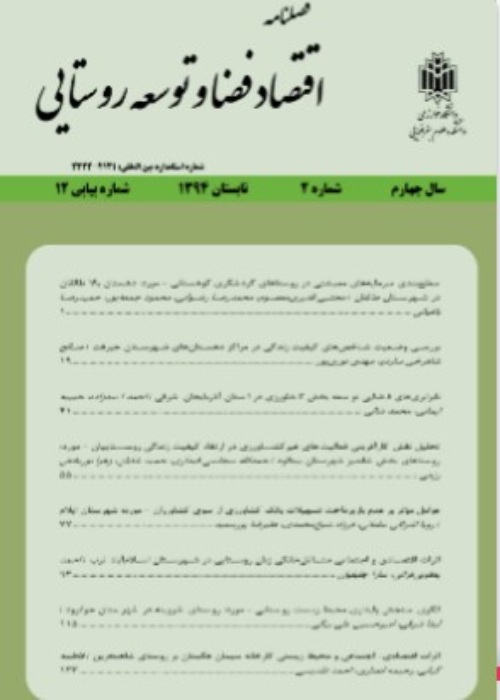Empowerment of local stakeholders to form non-governmental organizations for the spatial transformation of rural settlements (Case study: Javanrood County)
The extensive experience of many countries shows that the success of development programs in rural areas has not been favorable due to some limitations, especially the lack of participation of the beneficiaries or the villagers. Since it is only the villagers who can effectively identify their perceived problems and needs, therefore their participation in the management process and planning of rural development and transformation - in all its stages - is essential. In this regard, local people can participate fully and effectively when they are organized and trained to make a united and continuous effort. Therefore, in this context, non-governmental organizations, as people-oriented and participatory institutions, are known to be the most important main means of achieving this goal, which can penetrate rural communities and involve villagers in the process of participatory and sustainable development. Therefore, since the late 1980s and especially in the 1990s, and with the introduction of the community-oriented approach, non-governmental organizations have received attention. Because the ability of local stakeholders in community-oriented development is a fundamental factor in enabling them to participate and influence the development and spatial developments have a special place. Therefore, it is necessary to make an effort to empower the villagers in order to reduce the negative consequences of their weak intervention in the process of development and spatial development. On this basis, to improve the organized participation of villagers in the framework of non-governmental organizations, it is necessary to develop planning and policies in order to invest in the improvement of the facilitators of the empowerment of villagers, such as; Education, awareness raising, trust and confidence, cohesion and solidarity, etc. should be placed in order to provide the necessary grounds for the formation of non-governmental organizations. In this framework, the analysis of the growth and expansion of non-governmental organizations in the spatial transformations of rural settlements, taking into account the improvement of empowerment indicators, is a new approach that has been addressed in this research.
In the present study, based on a descriptive-analytical method and based on a questionnaire, the relationship between rural empowerment facilitators in the formation of non-governmental organizations and the relationship between these organizations in The process of spatial transformation of rural settlements (in the form of 15 indicators) was measured at the level of 30 villages and 300 sample households in the villages of Javanrood township. The collected data were processed using SPSS software and using correlation test statistics, and univariate and multivariate regression.
Findings showed that there is a significant relationship between the improvement of empowerment indicators and the rate of formation and expansion of non-governmental organizations in the direction of the spatial transformation of rural settlements. But, this relationship has been decreasing-decreasing, which has revealed the inappropriate position of research variables in the study area. In other words, the implementation of empowerment methods due to the dominance of the "top-down" and "state-based" approach has not been able to create a sense of power and empowerment in the local stakeholders and their effective and organized participation in the framework of non-governmental organizations. The low level of participation of non-governmental organizations has caused failure in the spatial development of rural settlements in economic, social, physical and environmental-ecological dimensions. Therefore, it is necessary to pay attention to and improve the facilitation indicators of rural empowerment such as; Education and awareness, knowledge and skills, cohesion and solidarity, trust and confidence, participation, institutionalization and political support of the government, and changing the approach to "community-based" and "bottom-up", are a good ground for their participation with the aim of creating non-governmental organizations in the direction the spatial transformation of rural settlements.
- حق عضویت دریافتی صرف حمایت از نشریات عضو و نگهداری، تکمیل و توسعه مگیران میشود.
- پرداخت حق اشتراک و دانلود مقالات اجازه بازنشر آن در سایر رسانههای چاپی و دیجیتال را به کاربر نمیدهد.


